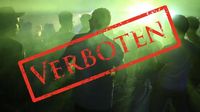As the sun rises on Good Friday, April 18, 2025, a hush falls over much of Germany, as the nation observes one of its most solemn Christian holidays. This day, commemorating the crucifixion of Jesus Christ, is marked by a series of restrictions that are deeply rooted in tradition, particularly the infamous "Tanzverbot" or dance ban. This prohibition, which varies slightly across regions, is a focal point of ongoing debate regarding religious observance and personal freedom.
In Lower Saxony, the Tanzverbot is strictly enforced. According to the Lower Saxony Holiday Law, public dance events are banned from Holy Thursday at 5 a.m. until Holy Saturday at midnight, encompassing a total of 67 hours. On Good Friday, all events in venues that serve alcohol must be limited to the serving of food and drinks—musical performances and any form of entertainment are off-limits. Violators face hefty fines ranging from €500 to €2,500, depending on the severity of the offense.
“We have the separation of church and state,” argues James Cowie, owner of the Brücks club in Osnabrück. He expresses frustration over the lengthy ban, stating, “Restricting non-religious individuals in their personal freedom doesn’t make the world a better place.” Cowie highlights the growing number of non-religious individuals in Osnabrück, questioning the relevance of such restrictions in modern society.
Conversely, Catholic representatives like Martin Schomaker, the dean of the St. Johann parish, defend the Tanzverbot as a vital cultural heritage. “We have very few silent holidays to pause and reflect,” he asserts, urging those who do not identify with the Christian faith to respect these traditions. This sentiment reflects a broader tension in German society, where secularism is on the rise, yet many still hold onto religious customs.
In Hesse, the rules are similarly stringent. Public dance events are prohibited from 4 a.m. to 12 p.m. on public holidays, including Good Friday, and the ban extends to Maundy Thursday and Christmas Eve. Even commercial sporting events are curtailed during this time. The Hessian Ministry of the Interior emphasizes that these regulations are intended to encourage reflection and family time during the solemn holiday.
“The Tanzverbot is just one of several special rules that come into effect on Good Friday,” explains a spokesperson from the ministry. “Public events that do not align with the serious character of the day are not permitted.” This includes circus performances, which are also banned on Good Friday.
Further south, in Bavaria, the restrictions are equally strict. All types of musical performances are prohibited in venues with bars, and public events where dancing is encouraged cannot take place. The Bavarian government has issued a general dance ban for silent holidays, including Good Friday. The rationale is to preserve the day’s solemnity, allowing individuals to observe the holiday in a reflective manner.
“On Good Friday, the atmosphere should be one of quiet remembrance,” says a representative from the Bavarian Interior Ministry. “We want to ensure that the serious character of the day is maintained.” However, the ban has sparked discussions about its relevance in contemporary society, especially among younger generations who may not hold traditional views.
The debate surrounding the Tanzverbot is not just limited to clubs and bars. In many regions, supermarkets must remain closed on Good Friday, with the exception of bakeries, which are allowed to operate for three hours. This regulation extends to cinemas, where certain films deemed inappropriate for a solemn holiday are banned. Over 700 films are on a blacklist, including classics like "Monty Python’s Life of Brian" and horror films like "Scream."
However, some argue that the laws should adapt to reflect changing societal values. Ellen Radtke, a queer pastor in Osnabrück, believes that maintaining such restrictions can alienate those who might otherwise engage with the faith. “Prohibitions create resentment,” she argues. “If someone wants to dance, a ban won’t suddenly make them more reflective or religious.” Radtke’s perspective highlights a growing sentiment among many Germans who feel that the country’s religious observances should evolve.
As the country grapples with its identity—balancing tradition with modernity—the Tanzverbot remains a contentious issue. Some see it as an essential part of preserving cultural heritage, while others view it as an outdated restriction that infringes on personal freedoms. This ongoing dialogue reflects broader questions about the role of religion in a rapidly secularizing society.
As Good Friday approaches, communities across Germany will once again confront the implications of the Tanzverbot. Whether one sees it as a necessary observance or an infringement on personal liberties, the discussions it ignites are indicative of a nation in flux—one that is trying to reconcile its rich religious traditions with the realities of contemporary life.









